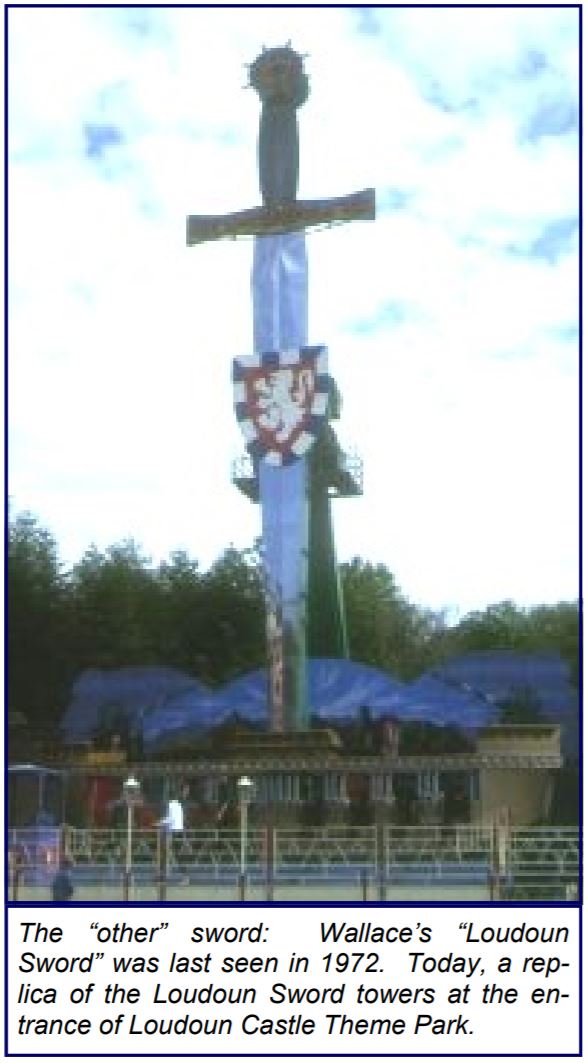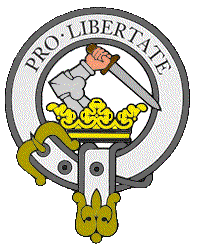 William Wallace’s “Other” Sword: The Lost Loudoun Sword
William Wallace’s “Other” Sword: The Lost Loudoun Sword
Mr. John G. McGill, FSAScot, resident of Riccarton, Scotland, has located a priceless piece of Scotland’s heritage: a long missing sword that belonged to Sir William Wallace.
“It is the Loudoun Wallace Sword which was a gift from the Hanseatic League in Lubeck to Wallace, as a symbol of his authority. After Sir William Wallace’s execution 701 years ago, tradition has it that his sword passed to Wallace’s mother, Lady Margaret Crauford Wallace. From her, the sword passed down through many generations and into the 20th century, being kept all this time at Loudoun Castle, near Galston.
In 1930 the Loudoun Wallace Sword was sold to J.H. Watson of Grangehill, Beith. Although the family no longer live in Ayrshire, the sword is still in Scotland in the ownership of the buyer’s family. It is believed that the family are considering the best future for the sword. Says Mr. McGill: The importance of this item to Scotland as a nation cannot be over stressed. It has no blood on it. It was never a weapon of war. It was a symbol of Scotland’s independence and of the authority of Scotland’s leaders and their faith in electing Sir William Wallace as Guardian of Scotland.”
John explained the origins of the sword; “When he was appointed as Guardian of Scotland, Sir William Wallace went to Europe to reacquaint the Hanseatic League, the equivalent of the EEC in it’s day, with Scotland as a trading nation, free again to do business. He carried with him a letter which he preappearances.” The first was in 1822 during the only visit to Scotland by King George IV. The second appearance was in 1930 when it was put up for sale. The third was in 1972 after someone stole the better-known Wallace sword from the monument in Stirling.
“An enterprising national newspaper tracked down the owner of the Loudoun Wallace Sword for a publicity feature in the hope that the stolen one would turn up. “Although hidden all these years there is a tremendous interest in this sword and of course in Wallace.” “I have no influence on any decision by the present owners, but if it is to be put on display, even on a ‘temporary loan’ I can think of only one place where such an important relic should go on display. After all, it is a symbol of authority and of our nationhood.’”
Mr. McGill, who is also published under the nom de plume “Craufuird C. Loudoun,” assures that the Wallace Loudoun Sword is still in Scotland and while he cannot reveal its exact location, he hopes that the current owners will put it on public display. When questioned about the number of Wallace swords in existence and he believes there are possibly four. The one in the archives at the Wallace Monument, the replica on display at the Wallace Monument which was created after the original was stolen in 1972, the current Loudoun Sword, and a possible fourth in the Wallace Collection in London.
As originally published in the Guardian, Winter 2006
UPDATES:
It should be noted there were several recent articles regarding the Loudoun Sword in the Scottish Daily Mail and the Herald on October 2, 2017. Both stated the sword was sold to a person name Moffat and not a man named Watson. Sean Donnelly, of the Society of William Wallace, said “The Loudoun sword is a 13th century type claymore, so it even looks more true than the Wallace sword everyone knows. The trail of the sword has gone cold after the passing of Mr Moffat. Our biggest concern is it is no longer in the country.
Where the sword truly is is a mystery that may never be solved.
It should also be noted that the Loudoun Castle Theme Park which hosted the huge replica of the sword pictured above permanently closed in 2010.

Comments (2)
Sadly my uncle, John G. McGill passed away in March 2018.
Mr McGill, I was looking for ‘Scottish Sovereignty – The House of Elmslie, Scotland’, but it seems to have been taken down, I hope not by the British state. It was a wonderful site that I referred to often in my posting history, and thank you so much for your explanation of the ‘union of the crowns’, ‘The People of Scotland’ term. I am so sad that others cannot now be referred to it.
I hope you are the John G. McGill referred to in the site. If not, then I’m sorry to have bothered you. If you are, then my hope is that you are well. I am a fervent independence campaigner of some 62 years of age, and I am eternally grateful to you for your extensive knowledge on the subjects of Scottish Sovereignty, McCormick v The Lord Advocate, 1953 etc.
Thank you, and good morning,
Kind regards.
Alastair Stephen Hosey.